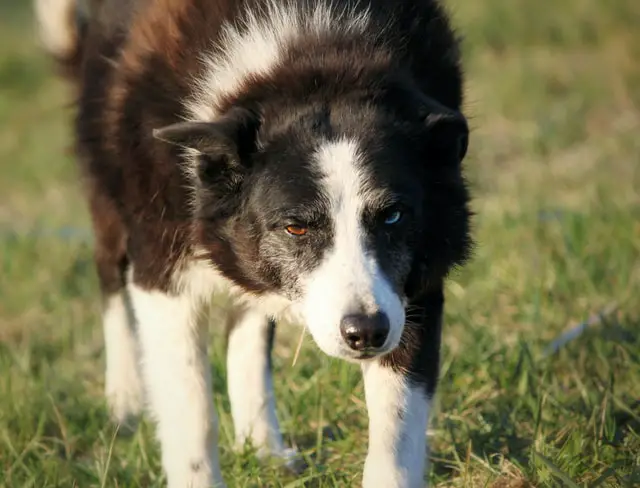Having dogs in our life actually makes us happy and really satisfied. However, despite creating a good relationship with our best buds, there will always come a time that we will have to say goodbye. Well, this sad reality pertains to all dog breeds including the Border Collie. So, for us to be prepared for that moment, it is good to know the life expectancy of a Border Collie.
In this blog post, we have here some basic information about the Border Collie that we should need to know. Moreover, their average life years are also stated here together with the factors that may affect them. We will also give you suggestions on how you can make the most out of the life span of your Border Collie. Check them all out here!
[banner id=”1016″]Getting to Know the Border Collie
Initially, we need to understand or to have a little information about the Border Collie before digging into their life expectancy. Let’s check their historical background and have a sneak peek of their vital information.
Border Collies Vital Information:
| Breed Group: | Herding Group |
| Origin: | United Kingdom, England, Ireland, Scotland, Wales |
| Weight: | 30 to 45 lbs (14 to 20 kg) Male (14 to 20 kg) / Female (12 to 19 kg) |
| Height: | 18 to 22 inches (46 to 56 cm) Male (48 to 56 cm) / Female (46 to 53 cm) |
| Coat Length and Texture: | Medium and rough / short and smooth |
| Coat Color: | black and white (most common) blue, blue merle, red merle, brindle, chocolate, gold, lilac, liver, red, sable merle |
The Border Collies are generally a dog breed from the herding group which comes in the medium-sized frame. They have double-layered hair that is very adaptable to various weather conditions. Luckily, this dog breed does not shed more during their shedding months and they are not also a hypoallergenic dog breed.
Despite being highly intelligent and energetic, the Border Collies also have some degree of sensitivity. Yet, they are highly suited for active families because the Collies are also happy dogs. Because of their enormous energy level and highly active lifestyle, owning and petting a Border Collie requires a farm and not a regular backyard.
Due to their innate herding characteristics, this dog breed needs a lot of exercises and must have to perform a number of tasks. Moreover, don’t get surprised as the Collies may herd and nip kids and other pets. This is also accountable for their innate herding trait. Sometimes, you may find them running after squirrels and even cars.
Border Collies also have this intense gaze making them recognized as “the eye”. They generally have a cold-eye look most likely with strangers. And as you stare at them, you will notice that they are like joining a staring contest.
Brief History of the Border Collies
Going back to the ancestral days of the Border Collies, they are generally versatile working dogs during their old days. During the first century BC, it was believed that the Roman Empire carried dogs with them to herd the livestock as they invaded Britain. As the Roman Empire disbanded, the Vikings came along the way with their smaller dogs as well.
The Vikings cross-bred their smaller dogs to that of the herding dogs of the Roman Empire. The resulting offspring gave birth to a new dog breed which is the more athletic Border Collies. Border Collies, during that time, served them well and performed great over the icy uplands of the United Kingdom.

Because of that, the Border Collies garnered an image of being a super dog. With incomparable autonomy, this dog breed is generally appealing. They have the ability to speedily learn commands and with great independence, the Collies do not need high supervision for hours.
Moreover, they are very responsible sheepdogs in handling livestock. They can even work for a longer time period within harsh terrain. The Border Collies have great strength, intelligence, and agility making them excellent show dogs.
What is the Life Expectancy of a Border Collie?
Generally, the life expectancy of Border Collie falls on an average of 12 years. The life span of a Border Collie is usually ranging from 10 to 14 years. Yet, in an instance, some Collies tend to live up to maximum life years of 17.
Well, the life expectancy of a Border Collie has been affected by many factors that actually rooted in their hereditary aspect. There is actually no means to identify how long a Border Collie should live since their health problems arise from their heredity. The best solution for this is to conduct a medical history check of the dog’s bloodline.
Most likely, reputable dog breeders maintain comprehensive documentation of the health status of the Border Collie. You should ask for that information before you purchase a Collie. That way, you will generally have an idea of what factors would affect the life expectancy of a Border Collie.
Factors Affecting the Life Expectancy of a Border Collie
In order for us to really understand how long is the life years of a Border Collie, we need to learn that there are some issues in which this breed is highly susceptible. Actually, among the other breeds of canines, the Collies are really healthy in general. But, due to their genetic background, some Collies may experience serious medical health conditions that may affect their life years.
Here are the potential medical issues that may cause serious impact on the health of a Border Collie:
1-Eye Problems
The Border Collies are highly prone to have issues concerning their eye health. Primarily, there are three major eye concerns that may generally have a great impact on the life span of a Border Collie. Luckily, DNA tests are available in order to detect these eye problems on Border Collies.
*Collie Eye Anomaly (CEA)
Generally, the CEA is one of the primary health concerns, together with epilepsy, affecting the Border Collie. This is actually a congenital eye condition of the Collie which targets the sclera, retina, and choroid of their eyes. Fortunately, it is may only be considered a mild condition in dogs because it may not usually impair the dog’s vision.

*Progressive Retinal Atrophy (PRA)
The PRA usually affects the Collies by slowly disintegrating the retina until it ends up losing the dog’s night vision. That loss of vision of canines due to PRA is either partial or totally complete. Afterward, it may potentially lead to entire blindness in the daytime.
*Lens Luxation
Another eye problem that the Border Collie may experience is the lens luxation in which the capsule of the lens dissociates on a 360O angle. Generally, the dissociation originates from the zonules or the fiber-like connections from the ciliary body to the lens capsule. The zonules basically keep the lens still in its position. Because of that, there will be complete dislocation of the lens from its original position.
2-Canine’s Deafness
Canine’s deafness is another health issue that may have an impact on the life years of a Border Collie. And, there are two types of deafness in which the breed is highly susceptible.
*Congenital Sensorineural Deafness
Actually, this is the first type of deafness that occurs on Border Collie puppies. During their birth, Border Collie pups may acquire this condition. And, it usually progresses as they grow older. Moreover, this first type of deafness in Border Collie may also be due to pigmentation. Most double merles or pure whites are generally affected compared to other coat colors.
*Adult-Onset Hearing Loss
Normally, this type of Border Collie deafness occurs at the age of 1 year to 8 years of their age. Test results during their puppyhood would reveal a normal auditory system. But, as they grow into adulthood, their hearing slowly loses.
3-Elbow Dysplasia
Another health condition that is commonly seen on the Collies is elbow dysplasia. Good thing, various hip exams for canines are already present to determine this dog’s condition. PennHip is one example of hip examination for canines.
4-Trapped Neutrophil Syndrome (TNS)
The TNS is also a hereditary condition on Border Collie in which the bone marrow of the canines creates neutrophils or commonly known as white cells. The problem is, the Collies do not have the ability to distribute these cells within their bloodstream effectively. With that, the end result would be an impairment of the immune system of the puppy.
Eventually, this condition makes the life years of a Border Collie a little shorter as it may lead them to death. Death may occur because the dog’s body cannot already fight the infections. Unfortunately, no cure ever exists to treat this canine’s condition, but it can be detected through a DNA test.
5-Neuronal Ceroid Lipofuscinosis (NCL)
Although rare, Neuronal Ceroid Lipofuscinosis is really fatal. Thankfully, this condition shows limitedly on Border Collies. However, once the Collies had been affected, they may experience serious impairment of the neurological system. This will then cause the early death of the Collies. Usually, the maximum life years of a Border Collie suffering from NCL is about 2 years.
6-Border Collie Collapse (BCC)
The BCC or wobbles, in other words, are usually popular among the herding dog groups. The usual cause of this disease is high-intensity exercises. Disorientation, mental dullness, loss of attention, unstable hind legs, and the constant need to lie down are the indications of BCC. In case you notice your Border Collie seems tired after running for hours without signs of wobbles, this already shows BCC. As of now, diagnosis and treatment for BCC are not yet available.
7-Cyclic Neutropenia (CN)
Another condition that affects the rough and smooth Border Collies is Cyclic Neutropenia. This is a recessive disorder of the stem cell in which the affected Collies tend to have lighter coats compared to non-affected litter. Again, merle-colored Collies are the ones highly susceptible to this condition.
CN or Cyclic Hematopoiesis is also called the Gray Collie Syndrome. Although this is a hereditary health-related condition, it would affect the life span of this dog breed to a lesser extent.
8-Osteochondritis Dissecans (OCD)
Mostly, dogs suffering from OCD have lame legs. This condition can be diagnosed through orthopedic examination. Usually, the dog cries out in pain when there is an applied pressure over the affected joints. Indications of this canine’s condition include leg swelling and warmth to the touch.
9-Patent Ductus Arteriosus (PDA)
PDA is a heart disease that is a common congenital condition in canines. This generally occurs once the muscle of the ductus arteriosus fails to constrict. Eventually, it leaves a way for the blood to flow. This will then lead to the disease on the left side of the heart or a more generalized failure of the heart.
Ways to Maximize the Life Years of a Border Collie

There will usually come a time that we almost forgot to pay attention to our Border Collie. And this may be one of the reasons that may affect the life span of a Border Collie. However, it is not too late to take good care of your best bud. And here are some helpful tips that you can do to extend the life years of your Collie.
*Border Collie Diet
The food that your Border Collie consumes has a major impact on the length of their life span. It is actually advisable to feed your dog with high-quality dog food. As much as possible, make sure that it generally contains protein and has an abundant amount of omega fatty acids. Keep away from those food having lots of additives or by-products. Always bear in mind that those ingredients are contributing factors to several dog’s health issues.
If you opt to feed the Collies with a healthy diet, consider giving raw food or BARF. This dog diet mainly composed of eggs, meat, fruits, and vegetables. Another good option would be a mixture of whole foods with kibbles like lean proteins, fruits, and vegetables. It is also advisable to seek professional help and make a thorough research before proceeding on dietary changes.
Moreover, try not to give human food to your Collie pups. Remember, some human foods like grapes, chocolates, and onions are dangerous for dog’s consumption. Aside from that, keep any human medicines, whether prescribed or OTC, in a place unreachable by Collie.
*Store chemical products in areas inaccessible by the Border Collie
There are generally numbers of household products that contain chemical ingredients. And all of these are harmful not only to Border Collie but also to other dog breeds. Inside the house, if you can’t refrain from using chemical cleaners like dishwashing, bleach, laundry detergents, mothballs, and alcohol, try to keep them out of sight and out of reach of the dog.
Moreover, the Border Collie spends much of their time outside the house roaming around, playing, and running. With this, it is always better to ensure that chemical products are not present on the lawn. Aside from that, there is a number of indoor and outdoor plants that may cause havoc to the dog’s health. So, be careful in having those plants in your vicinity.
*Maintain the Border Collie’s activity level
Because of their active lifestyle, the Border Collie really needs lots and lots of exercise. This is very crucial for them in order to keep a healthy body. And since they are working or herding dogs, they always have this nature of being always on the move. That’s why it is really important to stimulate their physical aspect.
As much as possible, take your Collie out for a walk or allow him to be with you while hiking. Letting them swim for a while will also do a great job. Aside from that, being a smart dog breed, the Border Collie also requires mental stimulation. So, even when staying indoors, you can still keep them busy by giving them some mind-boggling toys and puzzles.
*Take the Border Collie to the vet regularly
Well, the help of the veterinarians is very essential in taking care of your Border Collie. They are the one who has the ability to determine any issues that may occur at an early stage. Aside from that, regular visits to the veterinarian will open doors to make them highly familiar with your Collie. So, with that, diagnosing illnesses and underlying conditions will be better.
The veterinarians are also the responsible ones to vaccinate your Border Collie. Keep in mind that completing your dog’s vaccinations is also important in protecting your pooch from getting infections from elements such as parasites.
Final Thoughts
It is only about 10 to 17 years that a life of a Border Collie will be expected. However, regardless of those numbers, this dog breed can be a great companion once they feel the love and acceptance from any members of the family. Aside from that, to guarantee that the Collie is experiencing the best quality of life as they are still living, do ways as much as you can to be the best pet parents for them. Besides, your time and attention are what your Border Collie really needs to maintain a healthy and happy canine life.


